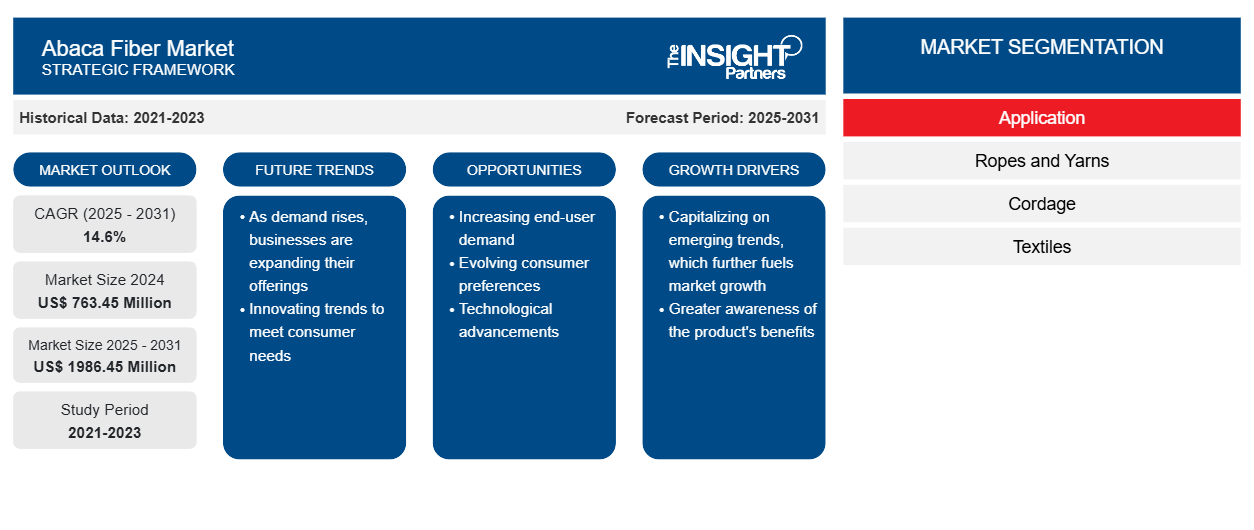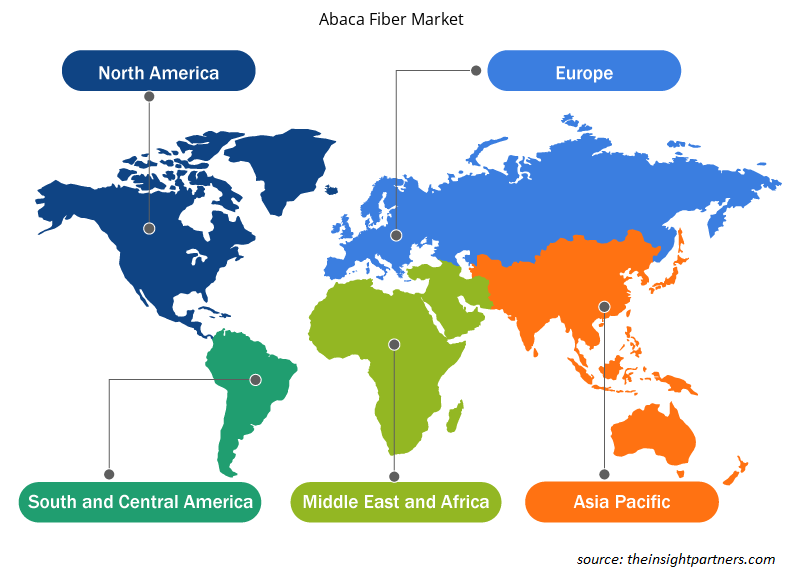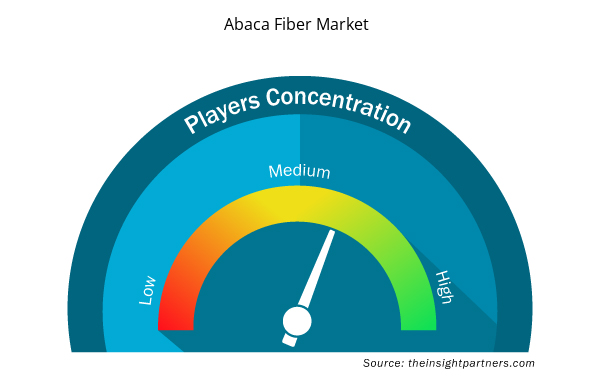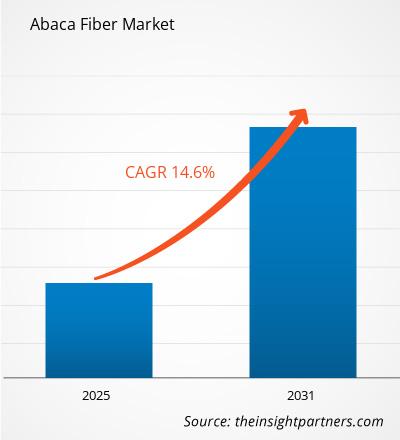The abaca fiber market size is projected to reach US$ 1986.45 million by 2031 from US$ 666.19 million in 2023. The market is expected to register a CAGR of 14.6% during 2023–2031. Increasing demand of abaca fiber from textile, paper and pulp, and automotive industry are likely to remain key abaca fiber market trends.
Abaca Fiber Market Analysis
With growing awareness about environmental conservation, there is a rising demand for natural and biodegradable fibers such as abaca, which is known for its eco-friendly properties. This increasing demand, coupled with the limited availability of abaca fiber, could potentially drive up prices and create supply chain issues for industries that rely on this material. Additionally, the competition for land and resources for abaca cultivation may also pose a challenge, especially in regions where other crops are in high demand. Furthermore, the labor-intensive nature of abaca production could also be a potential restraining factor for the market. Harvesting and processing abaca fibers require skilled labor and can be time-consuming, which can add to the production costs and limit the scalability of the industry.
Abaca Fiber Market Overview
Abaca fiber, also known as Manila hemp, is derived from the leaf sheath of the Musa textilis plant. It is well known for its durability, exceptional strength, and environmentally friendly attributes. As a sustainable and versatile natural material, abaca fiber has gained prominence across numerous industries such as textiles, pulp & paper, and cordage. In the textile industry, abaca fiber has emerged as an eco-friendly and distinctive alternative to traditional materials. Owing to its inherent strength, abaca fiber is considered an ideal choice for manufacturing durable and robust fabrics. Also, abaca textiles are celebrated for their flexibility, lending themselves well to a variety of applications. From clothing and accessories to home furnishings, the versatility of the material has positioned it as a sought-after choice for designers and manufacturers alike. Moreover, the increasing emphasis on sustainable fashion and the rising inclination of consumers toward environmentally friendly options propel the demand for abaca textiles.
Customize This Report To Suit Your Requirement
You will get customization on any report - free of charge - including parts of this report, or country-level analysis, Excel Data pack, as well as avail great offers and discounts for start-ups & universities
Abaca Fiber Market: Strategic Insights

- Get Top Key Market Trends of this report.This FREE sample will include data analysis, ranging from market trends to estimates and forecasts.
Customize This Report To Suit Your Requirement
You will get customization on any report - free of charge - including parts of this report, or country-level analysis, Excel Data pack, as well as avail great offers and discounts for start-ups & universities
Abaca Fiber Market: Strategic Insights

- Get Top Key Market Trends of this report.This FREE sample will include data analysis, ranging from market trends to estimates and forecasts.
Abaca Fiber Market Drivers and Opportunities
Growing Demand for Sustainable Materials
Abaca fibers are natural and biodegradable, making them highly desirable in industries aiming for sustainability. With increasing environmental consciousness, there is a growing preference for products made from renewable resources. Thus, the growing demand for sustainable and biodegradable materials is a major driver of the global abaca fiber market.
Application Versatility of Abaca Fiber
This natural fiber is renowned for its high tensile strength, resistance to saltwater, and ability to withstand heavy loads, making it a popular choice for a wide range of applications. One of the primary uses of abaca fiber in cordage is in the production of fishing nets. The strength and flexibility of the fiber make it well-suited for withstanding the harsh conditions of marine environments, providing fishermen with reliable and long-lasting nets. Additionally, abaca fiber is commonly used in ship rigging, where its resistance to saltwater and superior strength make it an essential material for securing sails and supporting the masts of ships. Application versatility is seen to leave a positive impact on the abaca fiber market.
Abaca Fiber Market Report Segmentation Analysis
Key segment that contributed to the derivation of the abaca fiber market analysis is application.
- Based on application, the abaca fiber market is divided into ropes & yarns, cordage, textiles, paper & pulp, handicrafts, fiber craft, and others. Ropes & yarns and paper & pulp are two prominent subsegments under the application segment. The ropes & yarns segment held the largest market share in 2023.
Abaca Fiber Market Share Analysis by Geography
The geographic scope of the abaca fiber market report is mainly divided into five regions: North America, Asia Pacific, Europe, Middle East & Africa, and South America/South & Central America.
Asia Pacific has dominated the abaca fiber market. In APAC, abaca fiber is primarily used for cordage production, including fishing nets, ropes, and twines. The strength and durability of abaca fiber make it well-suited for these applications, especially in industries such as fishing, shipping, and construction. The demand for abaca fiber in APAC is driven by the growing need for high-quality cordage in various industries and the increasing focus on sustainable and environmentally friendly materials. As a natural and renewable resource, abaca fiber is seen as a more eco-friendly alternative to synthetic fibers in many applications. Asia Pacific is anticipated to grow with the highest CAGR in the coming years.
Abaca Fiber Market Regional Insights
The regional trends and factors influencing the Abaca Fiber Market throughout the forecast period have been thoroughly explained by the analysts at Insight Partners. This section also discusses Abaca Fiber Market segments and geography across North America, Europe, Asia Pacific, Middle East and Africa, and South and Central America.

- Get the Regional Specific Data for Abaca Fiber Market
Abaca Fiber Market Report Scope
| Report Attribute | Details |
|---|---|
| Market size in 2024 | US$ 763.45 Million |
| Market Size by 2031 | US$ 1986.45 Million |
| Global CAGR (2025 - 2031) | 14.6% |
| Historical Data | 2021-2023 |
| Forecast period | 2025-2031 |
| Segments Covered |
By Application
|
| Regions and Countries Covered | North America
|
| Market leaders and key company profiles |
Abaca Fiber Market Players Density: Understanding Its Impact on Business Dynamics
The Abaca Fiber Market market is growing rapidly, driven by increasing end-user demand due to factors such as evolving consumer preferences, technological advancements, and greater awareness of the product's benefits. As demand rises, businesses are expanding their offerings, innovating to meet consumer needs, and capitalizing on emerging trends, which further fuels market growth.
Market players density refers to the distribution of firms or companies operating within a particular market or industry. It indicates how many competitors (market players) are present in a given market space relative to its size or total market value.
Major Companies operating in the Abaca Fiber Market are:
- Ching Bee Trading Corporation
- Wigglesworth and Co. Limited.
- Dragon Vision Trading
- Chandra Prakash and CO.
- Pulp Specialties Philippines, Inc.
- Wilhelm G. Clasen (GmbH and Co.) KG
Disclaimer: The companies listed above are not ranked in any particular order.

- Get the Abaca Fiber Market top key players overview
Abaca Fiber Market News and Recent Developments
The abaca fiber market is evaluated by gathering qualitative and quantitative data post primary and secondary research, which includes important corporate publications, association data, and databases. The following is a list of developments in the market for abaca fiber:
- Glatfelter Corporation, a global supplier of engineered materials, has entered into an agreement with Ekman & Co. to market Glatfelter’s high quality, specialty Abaca pulp exclusively through Ekman’s global sales agency platform. (Source: Glatfelter Corporation, Press Release, 2023)
- Bananatex produces compostable jerseys made from Abacá banana plants. (Source: QWSTION International GmbH, Company Website, 2023)
Abaca Fiber Market Report Coverage and Deliverables
The “Abaca Fiber Market Size and Forecast (2021–2031)” report provides a detailed analysis of the market covering below areas:
- Market size and forecast at global, regional, and country levels for all the key market segments covered under the scope
- Market dynamics such as drivers, restraints, and key opportunities
- Key future trends
- Detailed PEST/Porter’s Five Forces and SWOT analysis
- Global and regional market analysis covering key market trends, major players, regulations, and recent market developments
- Industry landscape and competition analysis covering market concentration, heat map analysis, prominent players, and recent developments
- Detailed company profiles
- Historical Analysis (2 Years), Base Year, Forecast (7 Years) with CAGR
- PEST and SWOT Analysis
- Market Size Value / Volume - Global, Regional, Country
- Industry and Competitive Landscape
- Excel Dataset



Report Coverage
Revenue forecast, Company Analysis, Industry landscape, Growth factors, and Trends

Segment Covered
Application

Regional Scope
North America, Europe, Asia Pacific, Middle East & Africa, South & Central America

Country Scope
This text is related
to country scope.

 Get Free Sample For
Get Free Sample For